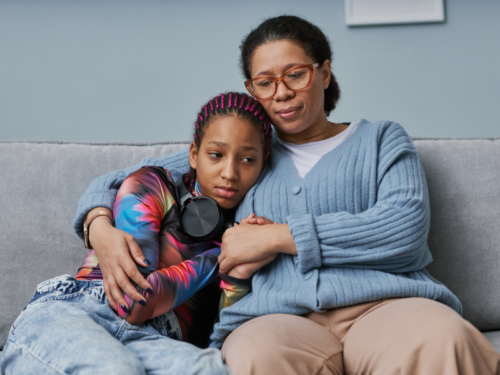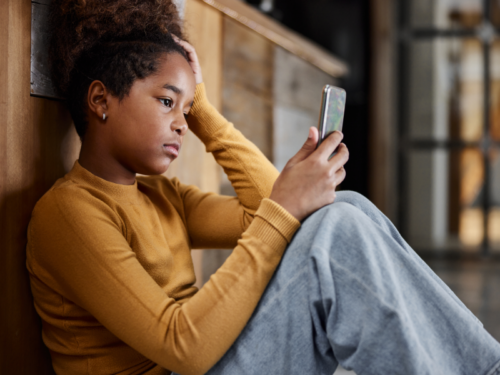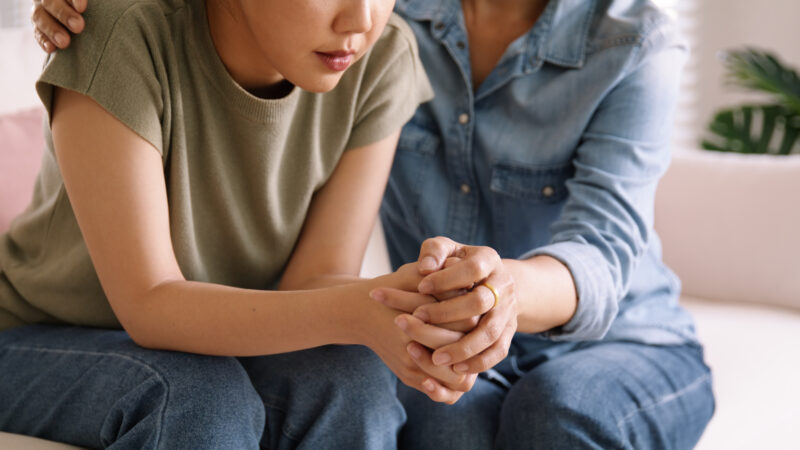
Table of Contents
How to Cope With Grief and Depression, According to Therapists

Written By: Sarah Fielding

Clinically Reviewed By: Courtney Way
January 15, 2025
5 min.
Learn about how grief can spur depression and how to cope with both at once.
Learn more about our Clinical Review Process
Table of Contents
Grief is often seen as the price of having loved — a sentiment that will likely ring true for many who have experienced bereavement. Unfortunately, its impact can be so strong that it brings another painful experience: a depressive disorder. Grief and depression are tied together quite acutely, with the former causing such incredible pain, frustration, and emptiness that a person can develop depression. Grief can also trigger depressive symptoms in a person who has previously lived with the disorder.
“When people have a history of depression or have a hard time processing their grief, it can often shift from grief into depression, or both, because of the heightened and prolonged access to these emotions,” says Charlie Health Licensed Creative Arts Therapist Courtney Way, MA, LCAT. Read on to learn how grief and depression fuel each other and how you can cope with both grief and depression at once.

Treatment for grief and depression
Virtual therapy personalized to your needs.
What is grief?
Grief is the experience of coping with a loss. It’s often associated with the death of a loved one, but grief can also occur after a breakup or another ending, such as losing a job or before a loss happens (known as anticipatory grief). It’s a rush of challenging feelings that come from being parted from someone or something you care about. “Grief can put people in touch with emotions such as sadness, anger, and guilt,” says Way.
What is depression?
As Charlie Health Group Facilitator Chris Hinton, MS, M.Ed., LPC, CLC, CTP puts it, grief is an “emotional response,” while depression is “a diagnosable mental health condition.” Depression can present as major depression when a person experiences a depressed mood and lack of interest in doing things for at least two weeks, the National Institute for Mental Health (NIMH) reports.
Unlike just being sad or having a low mood, depression can cause a range of severe symptoms. According to NIMH, depressive symptoms include but are not limited to:
- Feelings of hopelessness, pessimism, worthlessness, guilt, or helplessness
- Loss of interest in or enjoyment of hobbies and activities
- Change in appetite
- Physical pain with no clear cause
- Increased anger, impulsivity, and irritability
- Withdrawing or isolating from loved ones
- Fatigue and difficulty sleeping
- Increased substance use
- Experiencing negative thoughts and suicidal ideation
If you’re experiencing suicidal thoughts or are in danger of harming yourself, this is a mental health emergency. Contact The Suicide & Crisis Lifeline 24/7 by calling or texting 988.
How do grief and depression fuel each other?
Emotional exhaustion
Social withdrawal
Negative thought patterns
Physical toll
Grieving often leaves individuals feeling hopeless, which mirrors the symptoms of depression.
Depression can lead to isolation, compounding the loneliness already present in grief.
Grief-related guilt or regret can spiral into depressive rumination.
Both grief and depression can manifest as fatigue, changes in appetite, and disrupted sleep, worsening their impact.
Grief and depression produce some of the same symptoms, such as “loss of interest or difficulty functioning, feeling the urge or need to isolate, intense emotions or numbness, trouble sleeping, trouble focusing, worry, and pain,” says Way.
Both experiences are very intense and can further exacerbate each other — especially when left uncared for. “Grief is a natural response to loss, but it can evolve into depression when left unaddressed,” says Charlie Health Group Facilitator Bree Williams, LPCA. According to Williams, grief and depression can fuel each other in ways such as:
- Emotional exhaustion: Grieving often leaves individuals feeling hopeless, which mirrors the symptoms of depression.
- Social withdrawal: Depression can lead to isolation, compounding the loneliness already present in grief.
- Negative thought patterns: Grief-related guilt or regret can spiral into depressive rumination.
- Physical toll: Both grief and depression can manifest as fatigue, changes in appetite, and disrupted sleep, worsening their impact.
How to cope with grief and depression
The combined toll of prolonged grief and depression can feel overwhelming, but the pain they cause can dull and even go away entirely with the proper care. There are a series of steps you can take on your own, with a loved one, or in therapy.
1. Give yourself grace
Grief can be a terribly overwhelming experience — and for some, the pain continues for a prolonged time. “Realize that these experiences happen and normalize them,” says Way. “Take small steps. Every bit of progress, no matter how small, is progress.”
This process also involves embracing your emotions but in a healthy manner. Williams recommends granting yourself permission to feel all the grief inside you without judging or reprimanding yourself. You can do this through steps like journaling or talking with a loved one. Hinton further encourages you to embrace self-compassion in your path to feeling better.
2. Create a routine
Creating habits and a routine to get through each day can take a tremendous weight off of you. “Setting up a routine that includes a balanced diet, a healthy sleep schedule, and small, realistic goals for the day can be helpful,” says Way.
Williams seconds this: “Sleep, nutrition, hydration, and movement are critical for physical and emotional well-being.”
Again, set realistic goals for this routine — especially as you ease into it. “Depression can make even simple tasks feel overwhelming. Breaking your day into small, manageable steps can provide a sense of accomplishment,” says Williams.
3. Honor your loss
Healing from grief doesn’t mean completely ignoring what caused it or pushing away negative thoughts — especially when dealing with the loss of a loved one. Williams suggests honoring your loss through a ritual, such as writing a letter to your loved one or creating a box filled with memories of them. Taking this step during the grieving process can also allow you to feel some closure — even a tiny bit — and reflect on what you loved about them.
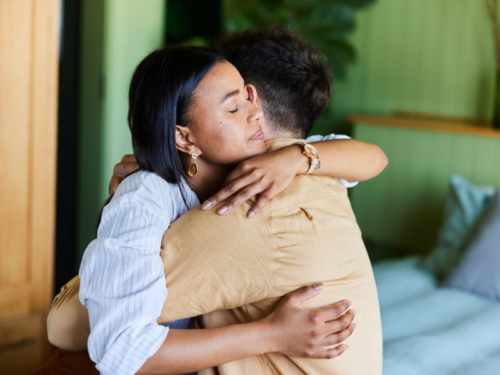
4. Lean on loved ones
Grief and depression are hard enough to face without doing it alone. Lean on the people in your life who will talk about your experience and ensure you’re taking care of yourself. “Community support is often undervalued, but is often one of the key supports for someone dealing with grief and depression,” says Way. It might also help to speak with another bereaved individual who understands the intense sadness accompanying a significant loss.
5. Seek out therapy
Again, you should not have to cope with intense sadness, prolonged grief, or a depressive episode on your own. There are resources that can guide you through this pain. “Therapy can help you distinguish between normal grief and clinical depression,” says Williams. She suggests exploring techniques such as cognitive behavioral therapy (CBT), grief counseling, and Eye movement desensitization and reprocessing (EMDR) — the latter is specific to trauma-related grief.”
A psychiatrist can also help you decide if medication, such as selective serotonin reuptake inhibitors (SSRIs), could benefit you. They are licensed to prescribe you medication and monitor your progress.
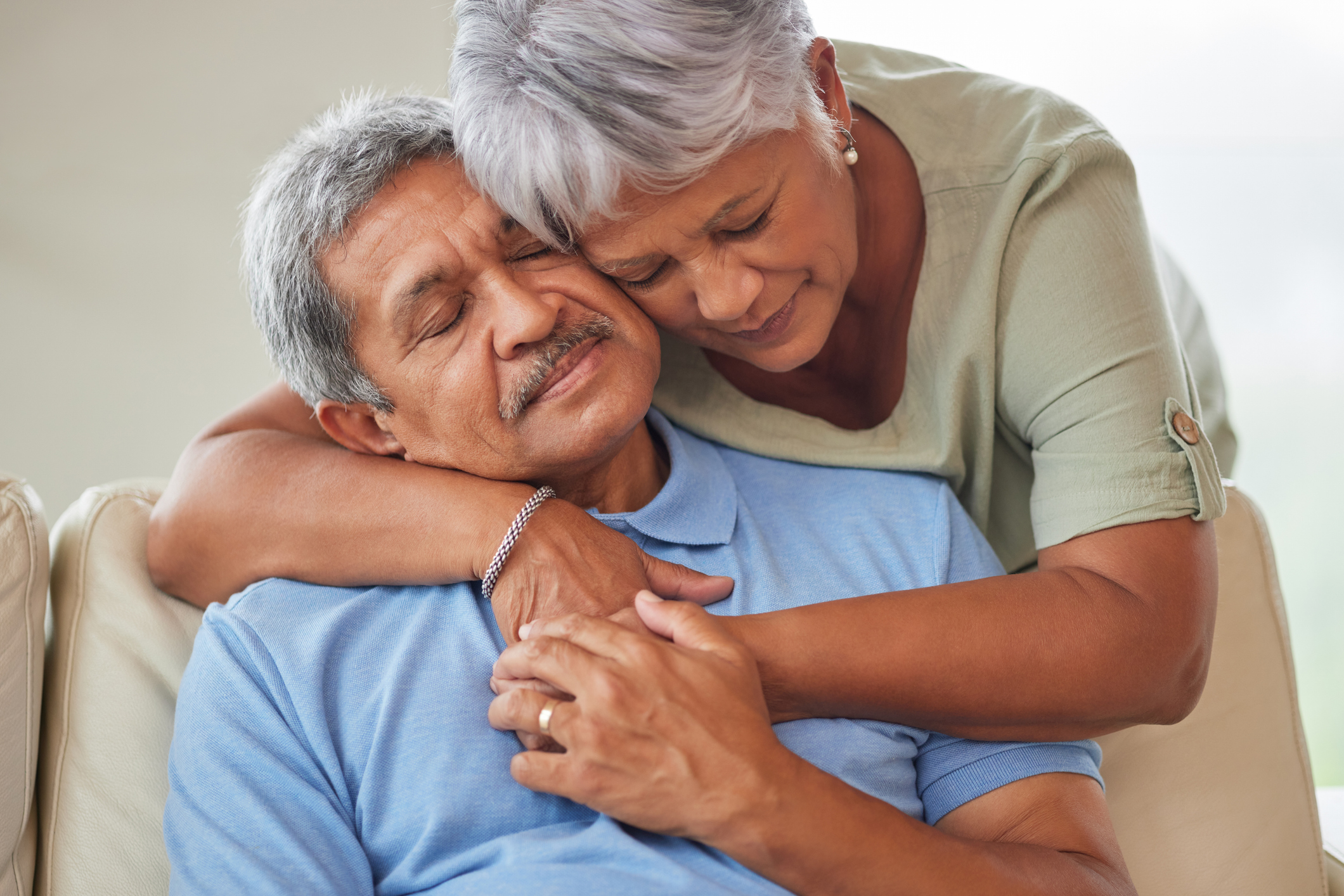
How Charlie Health can help
If you or a loved one are struggling with the grieving process, Charlie Health is here to help. Charlie Health’s virtual Intensive Outpatient Program (IOP) provides mental health treatment for people dealing with serious mental health conditions, including those struggling with a depressive disorder, grief, or both. Our expert clinicians incorporate evidence-based therapies into individual counseling, family therapy, and group sessions. With support, managing your mental health is possible. Fill out the form below or give us a call to start healing today.
References
https://www.nimh.nih.gov/health/publications/depression
